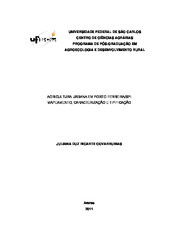Agricultura urbana em Porto Ferreira/SP: mapeamento, caracterização e tipificação

Visualizar/
Data
2011-02-14Autor
Covarrubias, Juliana Duz Ricarte
Metadata
Mostrar registro completoResumo
Urban Agriculture (UA) is different from, and complementary to rural agriculture in local food systems, in that its practices are integrated into a local urban ecossystem. It has been proven as a multifunctional tool that contributes environmentally, socially and economically. Currently, UA is gaining prominance on the world stage and in Brazil. It is essential to understand the existing iniciatives and demands of UA in order to implement adequated public policies. Therefore, the objective of this research is to analyse the current profile of UA in Porto Ferreira/SP. The cultivated areas of 20 urban districts were mapped, and 617 initiatives were found. From these districts, seven were selected for the interviews with urban farmers (n=74). Questionaires were applied to representatives of the local government, in order to evaluate the level of understanding and participation of those social actors. Multivariate analysis associated with qualitative approaches were used to characterize and tipify the UA, where 222 modalities of 116 variables where obtained from the original database, classified into 8 categories. The descriptive analysis made it possible to understand the distribution of the modalities in UA as a whole unit, while the typification distinguished five different profiles. It was found that the understanding of the policy makers on UA is very limited, and there are no legislation or policies directed to the topic. It is concluded that Urban Agriculture is an important activity in Porto Ferreira and significant in terms of number of cultivation areas. Moreover, this type of agriculture is important for the population's food security in both the access and the diversiy of vegitables consumed. There are no farmer organizations or institutional support. Yet, Urban Agriculture activities are part or the local urban dynamic as an iniciative of the population, highlighting the need to implement public policies to support these activities.